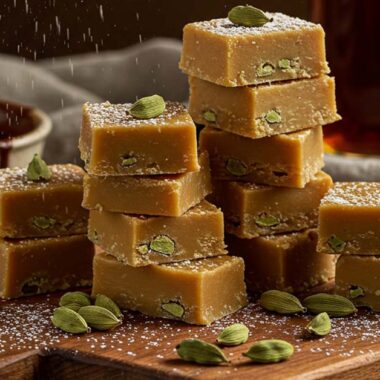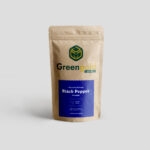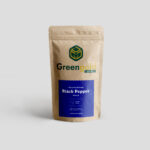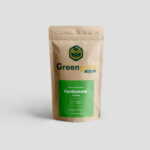Cardamom, a cherished spice with an intense flavor and captivating aroma, is not only valued in Indian and Ayurvedic traditions but also has a significant place in Traditional Chinese Medicine (TCM). Known as “Sharen” in Chinese, cardamom has been utilized for thousands of years to enhance health, improve digestion, and promote overall well-being. In this blog, we’ll explore how cardamom is used in TCM, its health benefits, and the ways it supports the body’s balance.
🌿 Key Benefits of Cardamom in Traditional Chinese Medicine
1️⃣ Promoting Digestive Health 🍽️
Cardamom is widely used in TCM to improve digestion and address digestive issues like bloating, indigestion, and nausea. It is believed to support the stomach and spleen by stimulating the digestive fire (Qi). It helps increase appetite, reduce bloating, and relieve nausea.
- TCM Remedy: Cardamom is often used in combination with other herbs like ginger and licorice to treat indigestion and nausea. A common preparation includes cardamom, ginger tea, or herbal decoctions to restore the digestive system’s balance.
2️⃣ Strengthening the Spleen and Stomach Qi 🧠
In TCM, the Spleen and Stomach Qi are considered essential for overall vitality and digestion. Cardamom is known to tonify the Spleen Qi, which is linked to the body’s ability to absorb nutrients and transform food into energy. By strengthening the digestive system, cardamom helps prevent energy imbalances that lead to fatigue and poor nutrient absorption.
- TCM Remedy: Cardamom is used in formulations to boost the spleen Qi and aid in food absorption, supporting digestive health and energy levels. It is often combined with ginseng, licorice, and angelica for optimal results.
3️⃣ Relieving Excess Dampness and Phlegm 🌬️
In TCM, excess dampness or phlegm is often linked to conditions like chronic cough, congestion, and mucus buildup in the respiratory system. Cardamom is aromatic and drying, helping to clear excess dampness from the lungs and digestive tract. It is considered an effective herb for treating phlegm and stagnation caused by damp conditions.
- TCM Remedy: Cardamom is often included in herbal formulas to treat cough, sinus congestion, and chronic respiratory issues like bronchitis. It helps in clearing phlegm from the chest and lungs.
4️⃣ Boosting Circulation and Qi Flow 💓
Cardamom is believed to stimulate the flow of Qi (energy) and blood circulation in TCM. It is used to treat stagnant Qi, which can lead to conditions such as pain, inflammation, and muscle stiffness. By enhancing circulation, cardamom helps relieve pain and inflammation associated with muscle tension and joint disorders.
- TCM Remedy: Cardamom is often used to promote blood circulation in formulas designed to treat pain and stiffness, particularly in the joints and muscles.
5️⃣ Supporting Mental Clarity and Mood 🧘♀️
In addition to its digestive and circulatory benefits, cardamom is known in TCM to calm the mind and help alleviate stress. It is believed to have uplifting properties that promote emotional well-being by regulating the flow of Qi. It’s often used to treat mood swings, anxiety, and stress-related disorders.
- TCM Remedy: Cardamom is used in herbal formulations designed to relieve nervous tension and promote emotional balance. It’s commonly combined with other calming herbs like chamomile and lavender.
6️⃣ Cardamom for Detoxification 🌱
Cardamom has natural diuretic properties that promote detoxification by flushing out toxins from the body through urination and sweating. It helps cleanse the liver and kidneys, improving the body’s ability to eliminate waste and toxins.
- TCM Remedy: Cardamom is often included in detoxifying and cleansing herbal formulations. It’s believed to support the liver’s detox process and improve overall detoxification.
🌱 How to Use Cardamom in Traditional Chinese Medicine
1️⃣ Cardamom Tea 🍵
Cardamom tea is one of the most common ways to incorporate cardamom into your wellness routine. In TCM, cardamom tea is often consumed to support digestion, relieve nausea, and promote Qi flow. You can make tea by adding 1-2 crushed cardamom pods to boiling water and letting it steep for a few minutes.
- Optional Additions: Add ginger, cinnamon, or honey to enhance the flavor and benefits.
2️⃣ Cardamom Decoctions 🍲
A decoction is a method of boiling herbs in water to extract their medicinal properties. In TCM, cardamom is commonly used in decoctions with other herbs to address specific conditions like poor digestion, low energy, and respiratory issues. To make a decoction, boil cardamom pods with other Chinese herbs and drink the mixture for therapeutic benefits.
- Common Herbal Combinations: Cardamom, licorice root, ginseng, cinnamon, and ginger.
3️⃣ Cardamom in TCM Formulas 🌿
In TCM, cardamom is often included in herbal formulas tailored to specific health concerns. These formulas may be prescribed by a licensed practitioner based on your individual constitution and needs.
- Example Formula: A common formula for digestive health may include cardamom, ginger, licorice, and tangerine peel to improve digestion and soothe discomfort.
🌿 Conclusion
In Traditional Chinese Medicine, cardamom is a highly regarded herb known for its digestive, circulatory, and mental health benefits. Whether used for boosting energy, calming the mind, or detoxifying the body, cardamom plays an important role in promoting balance and vitality. By incorporating cardamom into your wellness routine through tea, decoctions, or TCM formulas, you can enjoy its many health benefits and support your overall well-being.












